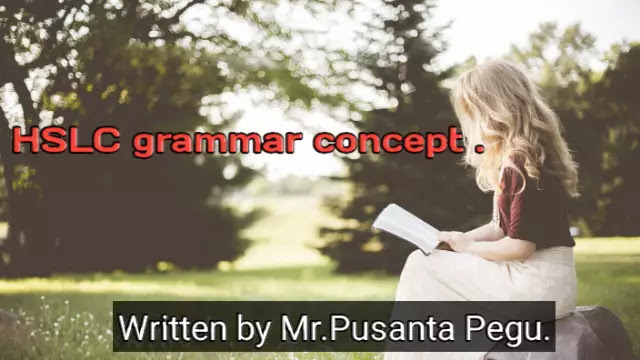HSLC grammar concept include verb,Number,types of verb,Defination of object
Collected by Mr.Pusanta Pegu.(Bsc.in Mathematic with D.el.ed.
(1) Singular Number ( একবচন).
(2) Plural Number ( বহুবচন).
* Singular Number(একবচন): যেতিয়া কোনো Noun বা Pronoun ৰ দ্বাৰা এজন ব্যক্তি, বস্তু বা প্ৰাণী বুজায় তাকে Singular Number বুলি কোৱা হয়। যেনে:- Book, Dog, I, Girl, Boy ইত্যাদি ।( When a person, object or animal is referred to by a Noun or Pronoun, it is called the Singular Number. E.g.: Book, Dog, I, Girl, Boy etc.)
* Plural Number(বহুবচন): যেতিয়া কোনো Noun বা Pronoun ৰ দ্বাৰা একাধিক ব্যক্তি, বস্তু, প্ৰাণী বুজায়, তাকে Plura Number বুলি কোৱা হয়।(When a Noun or Pronoun means multiple individuals, objects, animals, it is called the Plural Number.) যেনে:- Books, Dogs, We, Our, Girls, Boys ইত্যাদি ।
মনত ৰাখিব লাগিব যে Uncountable Noun বিলাকক আমি Third Person Singular Number বুলি ধৰি লওঁ । যেনে:- Rain, dust, air, love, water etc.
( Remember that we assume uncountable nouns as 3rd person singular numbers.)
* Verb( ক্ৰিয়া):- যি শব্দৰ(Word) দ্বাৰা কোনো কাম কৰা হোৱা বা ঘটা বুজায় তাকে Verb বা ক্ৰিয়া বুলি কোৱা হয়। অথবা যি পদে কোনাে কাম কৰা হোৱা বা ঘটা বুজায় তাকে ক্ৰিয়া পদ বোলে ।(The word by which something is understood to be done is called Verb) যেনে:- Come- অহা, Sleep - শুৱা, Go - যোৱা , Arise - উঠা , Bring - অনা , Buy - কিনা ।
* ক্ৰিয়াৰ প্ৰকাৰসমূহ:-(Types of verb)
(1) সমাপিকা ক্ৰিয়া ( Finite verb):-যিবোৰ ক্ৰিয়াই বাক্য সম্পূৰ্ণ হোৱা বা অৰ্থ সম্পূৰ্ণ হোৱা বুজায় সেইবোৰ ক্ৰিয়াকেই সমাপিকা ক্ৰিয়া বোলে ।( Verbs that mean the completion of sentences or completion of meaning are called finite verbs.)
যেনে:- (1) মই ব্যাকৰন পৰিলোঁ।
I have read grammar.
(2) তাই এজনী ছোৱালী।
She is a girl.
(3) তুমি এজন খেলুৱৈ।
You are a player.
(4) ৰীনা বাগিছাত কাম কৰে।
Reena works in the garden.
(5) বিমাই গান গায়।
Bima sings a song.
(6) তাই ইয়ালৈ আহিছিল।
She came here.
(7) সিহঁতে পথাৰত খেলে।
They play in the field.
(8) মই কাম কৰি আছো।
I am working.
*অসমাপিকা ক্ৰিয়া ( Non-Finite Verb or Infinite Verb) : যিবোৰ ক্ৰিয়াই বাক্য সম্পূৰ্ণ বা শেষ কৰিব নোৱাৰে আন ক্ৰিয়াৰ সহায়তহে বাক্য সম্পূৰ্ণ কৰিব পাৰে, সেইবোৰ ক্ৰিয়াই অসমাপিকা ক্ৰিয়া ।(Verbs that cannot complete or finish sentences can complete sentences only with the help of other verbs, which are infinite verb.)
যেনে:-
(1) হৰিয়ে কিতাপ কিনিব বিচাৰে।
Hari wants to buy a book.
(2) তাই বুৰঞ্জী পঢ়ি ভাল পায়।
She likes to read history.
(3) সিহঁতে সাঁতুৰিব মন যায়।
They like to swim.
(4) তুমি ফুটবল খেলিব মন যায়।
You like to play football.
(5) মই তোমাক পাহৰিব মন যায়।
I like to forget you.
* Intransitive verb(অৰ্কমক ক্ৰিয়া) :-যিবোৰ verb ক অৰ্থ সম্পূৰ্ণ কৰিবলৈ কোনো object ৰ প্ৰয়োজন নহয় সেইবোৰেই Intransitive Verb.(The verbs that do not require an object to complete the meaning are the intransitive Verb.)
যেনে:- 1) কুকুৰে ভুকে ।
The dog barks.
2) চৰাই উৰে ।
The bird fly.
* Weak verb বা Regular verb:- যিবোৰ verb অক Past tense আৰু Participle কৰোঁতে Verb টোৰ শেষত ed, d , বা t ব্যৱহাৰ কৰা হয়, সেইবোৰকে Weak verb বা Regular Verb বোলে।(Verbs that are used at the end of the verb ed,d, or t when using The Past tense and Participle are called Weak verb or Regular Verb.)
যেনে:-
Present Past Past Participle
(V₁) (V₂) (V₃)
Bend bent bent
Deal dealt dealt
Dream dreamt dreamt
Bleed bled bled
Lead led led
Meet met met
Speed sped sped
Shoot shot shot
* Strong Verb( বা Irregular Verb):- কোনো suffix ব্যৱহাৰ নকৰাকৈ মাজৰ Vowel সলনি কৰি যিবোৰ Verb ক Past Tense আৰু Past Participle লৈ নিব পাৰি সেইবোৰক Strong Verb বা Irregular Verb বোলা হয়।(Verbs that can be taken to The past tense and The past Participle by changing the middle Vowel without using any suffix are called Strong Verb or Irregular Verb.)
যেনে:-
Present Past Past Participle
(V₁) ( V₂) (V₃)
Abide abode abode
Arise arose arisen
Awake awok awaked
Bear bore born
* Transitive Verb:- যিবোৰ Verb এ আন শব্দৰ সহায় নোলোৱাকৈ অৰ্থ সম্পূৰ্ণ কৰিব নোৱাৰে সেইবোৰক Transitive Verb বোলে। অৰ্থাৎ Object ৰ প্ৰয়োজন হয়।(Verbs that cannot complete meaning without taking the help of other words are called transitive Verbs. That is, Object is required.)
* Object ৰ সংজ্ঞা:- Verb এ কৰা কাম বা বুজোৱা অৱস্থা কৰ্তাৰ পৰা যিবোৰ শব্দলৈ থেলি পঠিওৱা হয়, সেইবোৰ শব্দই Object.(The words to which verbs are sent from the work or refers to the state of being explained are object.)
* Object দুই প্ৰকাৰৰ:-(Two types of object)
1) Direct Object আৰু 2) Indirect Object.
* Direct Object:- বস্তু বা দ্ৰব্য বুজাবলৈ Direct object বুলি কোৱা হয়।(Direct object is called to mean objects.)
* Indirect Object:- ব্যক্তি বুজালে indirect object বুলি কোৱা হয়।(When a person is explained, it is called an indirect object.)
উদাহৰণ:- I gave a book to my brother.
a book --> Direct object.
my brother--> Indirect object.







0 Comments
Comment only if you don't understand.Request you not to give bad comments.